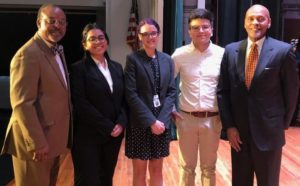
Through a partnership with entrepreneur and philanthropist, Roland G. Parrish and the Dallas Urban Debate Alliance, four Dallas ISD students competed in a public debate recently at James Madison High School in Dallas. The topic of the public debate is RESOLVED: The United States should abolish the Electoral College and elect the US President by popular vote.
The Science and Engineering Magnet team of Sophie Rahman and Juan Diaz argued for the resolution, while the team from Irma Rangel Young Women’s Leadership School, Joanna Marquez and Judith Juarez, argued against the resolution. Both teams were awarded scholarships, totaling $15,000 courtesy of Roland Parrish. The awards will be held in a trust at Bank of America until the student’s complete high school.
Dallas ISD District 5 Trustee, Dr. Lew Blackburn was in attendance. Tournament judges included Peter Bogdanow, Partner, Katten Muchin Rosenman LLP and Dallas Urban Debate Alliance Board Member; Matt Houston, President of the Black Chamber of Commerce; and, Dwayne Lewis I. Lewis, II, Attorney Buford & Ryburn, L.L.P. and Co-Chair of the Serving Children Committee of the Dallas Young Lawyers Association.





There have been hundreds of unsuccessful proposed amendments to modify or abolish the Electoral College – more than any other subject of Constitutional reform.
To abolish the Electoral College would need a constitutional amendment, and could be stopped by states with as little as 3% of the U.S. population.
Instead, state legislation, The National Popular Vote bill is 64% of the way to guaranteeing the majority of Electoral College votes and the presidency to the candidate who receives the most popular votes in the country, by changing state winner-take-all laws (not mentioned in the U.S. Constitution, but later enacted by 48 states), without changing anything in the Constitution, using the built-in method that the Constitution provides for states to make changes.
It simply requires enacting states with 270 electoral votes to award their electoral votes to the winner of the most national popular votes.
All voters would be valued equally in presidential elections, no matter where they live.